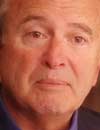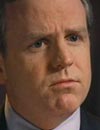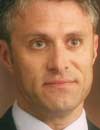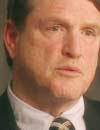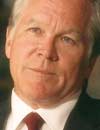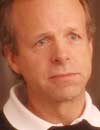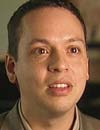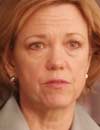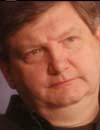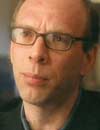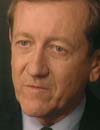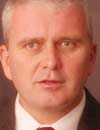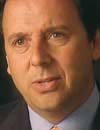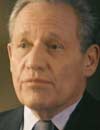- Ken Auletta
Writer, The New Yorker - Dan Bartlett
Counselor to President Bush - Mark Corallo
Former director of public affairs, Justice Department - Rob Curley
VP, Washington Post.Newsweek Interactive - Len Downie
Editor, The Washington Post - John Hinderaker
Blogger, Power Line - Bill Keller
Editor, The New York Times - Mark McKinnon
Former media adviser to President Bush - Markos Moulitsas
Blogger, Daily Kos - Dana Priest
Reporter, The Washington Post - James Risen
Reporter, The New York Times - Jay Rosen
Blogger; Professor, New York University - Brian Ross
Chief investigative correspondent, ABC News - Bill Sammon
Reporter, The Washington Examiner - Ron Suskind
Author, The One Percent Doctrine - Bob Woodward
Reporter, The Washington Post
[The notion about the press having a check-and-balance function, do you think that's what the framers of the Constitution had in mind?]
The framers had in mind the First Amendment, basically. ... They gave the First Amendment as a way of giving a fourth branch of government -- in fact, the press -- an ability to question those in power in any of those three branches of government. I think over the years the press, more often than not, has served that function very well. But many times we did not serve that function well, and many times we have acted like the special interests that people like Bush and others -- Democrats or Republicans -- complained about.
If you listen to Bush carefully, to his complaint about the press, he's really echoing much of what you hear from the left -- [political commentator and Air America host] Al Franken, [author and media critic] Eric Alterman and others. That complaint is that we do the bidding of our corporation owners. Bush would never put it that way -- he's a conservative, and free enterprise is good -- but the critique is the same. The critique is that the business interests that run the press are interested in scoops, headlines, selling papers, boosting circulation, and therefore they go for more entertainment stuff and more conflict stuff and more wow stuff. That's a legitimate complaint against the press.
But there are also very serious reporters who day in and day out get up in the morning thinking they have a public calling and try to do it honestly and try and find out what's really going on in Iraq at the risk of their own lives. And there are reporters who tried honestly -- Knight Ridder, for instance -- and really got the weapons of mass destruction and introduced a note of skepticism to that conversation, that maybe Iraq didn't have weapons of mass destruction. Those reporters are really performing a very vital public service, and I think politicians -- starting with Bush, but not just conservative Republicans -- too often forget that. ...
Bush has talked about getting around the media filter. ... [Is that normal, to want to sidestep the media?]
Well, every president wants to figure out a way to deliver their message unfiltered. They don't want an anchor telling you what it means. They don't want a reporter, [NBC's] Tim Russert, asking tough questions on Meet the Press. They want to be able to talk directly and not be questioned. By the way, CEOs have the same desire. So do journalists. I would love to be able to just have my version of the world and not have someone ask me inconvenient questions. We're just human beings, all of us.
The press is performing a necessary, adversarial function. Now, if we go too far and we say, "We are your adversary; we are your enemy," then I think we're stepping out of our proper role. But our job, proper role, is to ask questions of people in power, and oftentimes people in power don't like to be asked questions. It's very natural.
[Former White House Chief of Staff Andy Card told The New Yorker that he doesn't believe the press serves a check-and-balance function, and the president's former media adviser Mark McKinnon told us he agrees.] What's your view of the role of the press in terms of the administration?
We actually believe the press plays a valuable role for the American people and is a fundamental aspect of our democracy. Without the media, the American people won't have the type of information they need to hold their leaders to account.
... Andrew Card, the now former chief of staff, has said that he doesn't believe that the news media have a real role as a watchdog, as part of the balance of power in government.
I've seen that quote. I would strongly disagree with Mr. Card. I look at the founding of this country, and I see a bunch of very, very wise men who sat down and said, we've got to do something different here. We have to make freedom real; we can't just say that we're free. We've broken off from the mother country. We've actually got to institute these things. We have to back them up, and the one thing that's going to keep us honest is a free press. That's [as] true today as it was in 1789. It has not changed. And you can love them, you can hate them, but by God, they do have a role. ...
I think it's hugely important that someone has to be the Fourth Estate. Somebody has to be looking under the table and taking care of our communities and being the watchdog. That being said, I believe in my heart that if you went into a newsroom and said, "OK, who would like to do this big investigative piece, and who would like to cover the prom?," justifiably so, I think everybody in the room would raise their hand for the big investigative piece instead of the covering the prom. I don't blame them, but at some point, we also have to serve those needs as well.
I don't think it's an either/or thing. I think we have to do big-J journalism and little-J journalism. My point in that quote is that I think that maybe we've forgotten how to do little-J journalism. Not all of us -- I just came from a 19,000-circ newspaper that knows how to do little-J journalism as well as the big, investigative, local-enterprise things. But I don't think we should underestimate the power of that, you know?
I wanted you to comment on a statement made by Andrew Card when he was [President Bush's] chief of staff. ... He said: "The press don't represent the public any more than other people do. In our democracy, the people who represent the public stood for election. I don't believe you have a check-and-balance function."
Well, not only do I disagree with him, I find this ironic, and I'll tell you a story about it. We all like to quote Jefferson in our business, but Jefferson made clear ... that he expected the press to have that role. The First Amendment specifically gives us the independence and the freedom to have that role. Whether or not we represent the public is a technical notion, because in a representative democracy elected officials represent the public. We serve the public. We provide the public the information they need in order to be informed citizens and exercise their rights as citizens.
But it's interesting that Andy Card would say something like that, because earlier I was telling you ... [there was a story that] had to do with the locations west of Washington where government officials go every day to work ... in case the government is destroyed in Washington. ... Andy Card called me and asked if we were working on that story. ... We had what was I thought a very civil and constructive exchange in which he completely recognized the public service function of our publishing the story. ...
Some would argue it's the job of the press to "comfort the afflicted and afflict the comfortable;" that it's natural for them to be in an adversarial stance with authority.
I don't buy the theory that reporters aren't against Republicans or against President Bush; they're just anti-authority, or it's just their job to be adversarial. That has not been my observation in many years of watching the news.
There are certain groups that they're almost never adversarial to. How often do you see mainstream reporters exerting any critical or taking any critical look at all at the environmental movement, for example, or at feminism? Those kinds of things get a complete pass. They talk about afflicting the comfortable. Well, the most comfortable people in our society are liberals who are environmentalists and feminists. And believe me, they are not be afflicted by the press. ...
Where's the adversarial role, for example, toward the judicial branch of government when the United States Supreme Court comes out with a liberal decision? Which hasn't happened so much lately, but over the years, it's happened a lot.
Where was the check and balance? Where were the newspaper stories questioning that decision, pointing out its weak points, pointing out the other side, speaking truth to power, afflicting the comfortable Supreme Court justices? It didn't happen. Journalists like to talk about being adversarial, but the truth is, ... [who] they're mainly adversarial toward is Republican politicians.
If you look at a press conference today with President Bush, it's shocking. It's disgusting to see how some of these reporters put themselves in the position of being representatives of the Democratic National Committee, in effect, being hostile to the president in such a way that he can't possibly come across positively to people who are watching that event. That didn't happen with Bill Clinton. And if we have a Democratic president starting in 2009, it's not going to happen there either.
Doesn't mean that no reporter will ever ask a tough question. Sure they will. But you will not have the kind of across-the-board hostility that you see in a Republican administration. ...
Look, our job -- and it's been the job of the press as long as the press has existed -- is to help produce an informed electorate so that they can make up their minds. In the case of the war on terror, when you're in one of these really sensitive, fearful times, our job is to let readers know how their government is doing: Are they doing a good job in protecting the country? You can't do that if you allow the government to be your editor or to be your censor. ...
... But it's kind of interesting to turn the telescope around and ask: This administration's focus on trying to control the flow of information, what effect does that have on national security? I would argue that it has damaged national security in a couple of ways. One of them is that by demonstrating very little tolerance of dissenting views within the government, ... the administration has created a lot of sources. ...
There's a really interesting piece that Jonathan Rauch wrote in the October Atlantic, ["Unwinding Bush"]. ... You need rules for how we're going to fight this war, and there ought to be a national consensus for those rules to stand up. What he argues is that instead, the administration, by trying to run the war on terror out of its hip pocket, ... what they've done is missed the opportunity to build a national and even international consensus.
So when we think about the press and national security, our natural impulse is to drop into a defensive crouch and say, "No, it's our First Amendment right to do this." Which it is, but I would say it's also a positive good that we should celebrate: That by exposing some of these programs, we have kicked off the kind of national debate that might actually create a consensus and might build the kind of rules for the war on terror that would sustain the country for a long time. ...
Let me take you back to Ken Auletta's interview with Andy Card. "Do you accept," he was asked, "that the press has a legitimate check-and-balance function?" And he said, "Absolutely not." He said, "Congress has a check-and-balance function; the judiciary does, but not the press." And Karl Rove and apparently [Counselor to the President] Dan Bartlett and others that Ken Auletta talked to confirmed that. Is that the administration's view? Is that your view?
I think Andy Card was right. I think the true checks and balances are the judiciary and the Congress. The press is not elected, so who's going judge which press outlet is the proper check and balance?
But the First Amendment -- it's there for a reason. President Jefferson said he'd rather have a free press.
Sure. Nobody's suggesting that there shouldn't be a free press.
But do you see it as having a check-and-balance function in terms of especially the federal government?
I think that the press has a duty and an obligation to report on local government, state government, federal government -- to be aggressive, to do its job. And its job is to report on whatever it's covering. The administration's job is to make policy and execute policy, and the press's job is to report on that.
[But these technological changes must have helped presidents stay more on message?]
Technology has had more of an impact on the presidency and how the presidency communicates than anything. News is virtual now. It is not 24-hour news cycles; it is instant news cycles. It is live. News is live all the time, around the clock. That has a huge impact on news organizations, on weekly news magazines. Their whole profit enterprise is completely turned upside down now.
It changes the way you, as a media strategist, look at a campaign as well.
Yeah, absolutely, sure. Everything we do is radically changed because we can digitally compress media now. Whereas I used to have to send a little box overnight to news stations, now we can just punch a button, and it's digitally sent immediately. In the 2004 campaign, we could produce an ad, and with one button it would go to 6 million people just like that. ...
Technology has reformed the process. We've always been accused of only communicating in 30-second sound bites. Well, I never liked that, but we were hostage to broadcast media, and that's all we could do. Now I can produce long-format video -- substantive on issues-- and put it on the Internet, and voters can see and hear and feel where our candidates are on a variety of issues without being limited to 30 seconds.
When you sit down in a media strategy now, in terms of putting a budget together, you don't necessarily have to be thinking in terms of how many minutes or hours I'm going to buy on local TV or pay the rates on local TV, because you can get around that, too.
It hasn't changed completely -- we're still buying broadcast from cable television -- but the paradigm is shifting, no question. And as I said, we can produce video; we can produce it quickly and we can distribute it broadly. We can have somebody talking about an issue for five minutes rather than 30 seconds, which is great. It's good for voters, and it's good for the candidates. ...
Our problem on the left with the media is when they don't do their job right; when they think that they're stenographers for the White House; when they just repeat mindless spin without actually providing context, without providing fact checking. ... Now, on the right, they want to destroy the media, because they're trying to build an alternate reality that matches their ideology. ... If the media reports the truth unspun, that's a problem for them, so they want to destroy the traditional media. They want more Fox News, and they want less real reporting. ...
[The Colbert Report's] Stephen Colbert is sort of a hero on our side of the aisle because not so much [for] his mockery and satire of Republicans, but of the media itself. I know the media does not like him. At the White House [Correspondents' Association] dinner this year, his standup at that dinner bombed terribly in the room, but it was an absolute hit outside of the press, outside of the media world. ...
So this resonates with people. The need and the desire for a press that acts like a check on government, that acts like it's working in the public interest, as opposed to just trying to ingratiate themselves with the people in power and get invited to the right cocktail parties. There's a hunger for this kind of reformation of the media outside of Washington, D.C., and outside of the New York media establishment. It's a big country, and I don't think New York and D.C. realizes it. ...
If the president of the United States, who calls himself the "decider," decides that it is not in the interest of the national security of the United States to have detention centers revealed, ... who are you to decide otherwise?
The Constitution does not make the president of the United States the decider when it comes to the flow of information. That's so fundamental to who we are as a country, that we have a press that is independent of the government. It's not a perfect system in that we could make mistakes, but the alternative is that the government does decide what gets in print, and that would be revolutionary. That would make it impossible to do accountability stories. ...
Your story and a couple of others, like the [New York Times'] NSA [National Security Agency] wiretapping story, set off a determination by the government to really crack down. ...
Well, that's a reflection of what they think the public should know. And this government tries very hard to control the flow of information, as we saw in the buildup in the war in Iraq.
But every administration has wanted to control the flow of information.
Right, but using the FBI to do so is a different level. Using the Espionage Act potentially is a different -- it's the quantum leap. I would say that it's a misunderstanding of the role that the media plays in a democracy and in our country as a watchdog organization. ...
You have branches of government that are supposed to be checks and balances on one another. Theoretically you're supposed to have that on intelligence with the intelligence committees. But the intelligence committees for years have been dysfunctional; I would say that they still are today. ...
The committees are handicapped to begin with, because unless you're on the committee or have been a member of the intelligence community, you come to those committees with barely any knowledge of this whole secret world, which makes you less effective as a watchdog.
That's just a convenient thing for them to say, politically. The best way that we can promote ourselves as a country in the Middle East and around the world is to show that we are a real democracy, and a real democracy has a vigorous and aggressive press. It's what we are trying to showcase in Iraq, is the idea of a democracy. If we, at the same time, are trying to crush free press in our own country, what does that say about the model we are trying to present in Iraq or elsewhere?
They'd say that's all great rhetoric, but what we're really trying to do is preserve the idea that there are secrets vital to the national security of the United States that need to be kept secret, and if there are people out there willing to publish those secrets, it's going to endanger the United States.
Democracy is messy, and it's not something that can be engineered from [CIA headquarters in] Langley, Va. ... And if they want the same thing in Iraq or in Palestine or in Lebanon, they're not going to always get the outcome that they want.
You can't try and control the American press. At a time when there has been one party controlling Congress, the White House and, to a great degree, the courts, basically the only oversight in Washington today is the press. What they have tried to do here is to try and shut down the only real oversight left in Washington.
You mean Congress isn't doing its job.
The congressional oversight has been very weak and, I would argue, docile under the Republicans while Bush has been president. ... When we wrote the NSA story, it wasn't our judgment that this should be not happening. ... The only thing we're saying is this is something the American people should know about; they then can decide whether it's something they want to continue or not. That's our role. Our role is not to say to the American government, "Don't do this." Our role is, "This is happening, you decide."
Ultimately it becomes incumbent on the serious press to quit their relationship, to stop going [to briefings] and start reporting completely from the outside. ... They're already on the outside. They should just quit entirely and go to work on reporting the White House from the outside. ...
Why shouldn't they go after reporters if in fact they're looking at a leak of national security information?
Because I think it infringes on the public's right to know. We are part of the fabric of democracy, where we are reporting important events, and to try to put a chill on us is counterproductive. The crime involved is not a crime we've committed. We haven't broken the laws in any way. We've reported what we've learned. ...
I'm thinking of myself as an investigator of Brian Ross, trying to find out the answer to a question. You go to the people who might know. If it's a leak and a leak that was meant to be public, you go to the reporter, because that's the agent who made it public.
Right. But you balance, I think, in a free society, how you conduct an investigation like that. For instance, my lawyer knows my sources. They would never think of going after him to get the information because they respect the confidentiality between a lawyer and a client. I think they should show the same respect about the confidentiality between a news source and a reporter.
But what if it's national security information where many lives may be potentially at stake?
Well, that's the flaw in the argument; that really isn't the case. They're going after a leak after the fact. They're not trying to save lives. It's not something about to happen. ... This is an effort to chill internal complaints about, for instance, with the CIA, actions they've taken that their own employees find reprehensible and repugnant. ...
Who are you, Brian Ross, to make a decision as to what should be known by the American public and not known by the American public?
I'm a reporter for ABC News, and if there are people who are responsible, who I've checked out, inside the CIA or the NSA [National Security Agency] or the FBI, who feel this is information that is important to be known by the public, that's who I am then. That's the kind of thing we put on the air. ...
Didn't you run some radioactive material through the border?
Twice.
To prove you could do it?
To show that the security that was in effect was nowhere near what the government said it was.
And, some would argue, to show Al Qaeda that they could do it.
Al Qaeda already had figured that out. We had the notes from some of the captured Al Qaeda leaders who had investigated how to essentially rent a shipping container ... as a way to smuggle nuclear material into this country. Essentially we're doing what Al Qaeda had already planned to do. We didn't teach them a thing; they knew this.
But you showed them it could be done. They never tried.
No. And what we showed was that the defenses against it weren't there, as they said they were. I wish we had done a story on Sept. 9 of 2001 that showed airport security was lousy. That would have been valuable, too.
In fact, there were stories done about airport security being lousy for years.
There are not enough of them, because I think that's our role; that's how you get change. You put a spotlight on it. It changes because you do that. ...
... [Former CIA Director Porter] Goss said reporters should be brought to a grand jury and compelled to reveal who's leaking classified information and raised publicly the question: Are you above the law?
I'm not above the law. I don't think I've broken any laws. And I think that he's where he should be now, [and] that's out of public office.
Mr. Goss?
Mr. Goss. He had an agency where he was despised and where he put in place policies that were objected to across the board by lots and lots of CIA officers, current and former. It was those officers who were disgusted with Goss and the way he ran that place, who felt they had an obligation to get the word out [about] what had become of the CIA.
That's how we were able to do our stories. I know that, talking to the people who talked to us. So he should look in the mirror.
Congressman [Peter] King [R-N.Y.], [state] Sen. [Jake] Corman [R-Pa.] and the attorney general of the United States [Alberto Gonzales] think it's even more serious, that people should be prosecuted for espionage. Just a bunch of smoke?
Well, they are politicians, and I think that doesn't solve the problem. It's foolish talk, frankly.
Other societies, you can't report this kind of material, period, right?
We're different. We have a First Amendment. It's one of the strengths of this country.
The reply is the Constitution is not a suicide pact.
And no one says it is. There's no story we would do here that would put in danger lives. When we've done stories, the argument was, well, you make it impossible, if you reveal this, for the CIA ever to make any more secret deals.
Well?
Well, it's not my job to protect the clandestine operations of the CIA when they make deals that would violate the country's own laws when they're making the deals.
Foreign intelligence operations and law enforcement agencies are sometimes reluctant to tell U.S. agencies what they know because it may be revealed, get leaked. So it does affect the CIA's ability, for instance, to share information.
The CIA objected to our story about the secret prisons they're operating in Europe, and their position was, essentially, "How are we ever going to be able to make any more secret-prison deals if you do this story?" Didn't put any lives at stake. It really didn't. ...
There's a famous quote from [former Bush Chief of Staff] Andy Card in The New Yorker in 2003, in which Card apparently tells [writer and media critic] Ken Auletta that he doesn't believe that the press serves a check-and-balance function; that Congress does, the judiciary does, but not the press. What's your take on that?
I don't know that I agree with Andy Card on this one. It's the whole concept of the Fourth Estate, of the free press. The press, for all its problems -- and they are legion -- and for all its shortcomings, and for all its liberal bias, and for all its wrongheadedness, it serves a vital role in our society in terms of checks and balances. ... Without the press, I really don't think America works. I think you absolutely have to have the press to ferret out information. ...
The press, more often than not, will alert people [to] problems that they need to be made known of. ... That's not a function of liberal or conservative bias; that's a function of the press being a bulldog and going out and finding the story. So in that sense, I think they're a vital check and balance on our society.
I can't put you in the position of speaking for the president, but since you've had access to him -- more than most journalists -- do you feel comfortable saying to what extent that might reflect the president's own views about the press, what Andy Card had to say?
I don't think that President Bush would necessarily agree with Andy Card on that particular case. I do know that the president fundamentally regards the press as a biased institution that is not there to help him in any way, shape or form. ... Institutionally, they're not his friend. Institutionally, these are reporters who personally believe that taxes should be higher; that [access to] abortion should be pretty much unlimited; that there should be some constraining of the U.S. military; that we're too unilateral; that we need to defer more often to the United Nations and not be so "go it alone." So the press is not filled with people who agree with Bush. I think Bush is keenly aware of that. ...
I think in the last year, two years, there has been a strong countermovement among the press, saying, "Now, wait a second -- we get a seat at the table in the Bill of Rights." The founders knew about us. ... They understood that the free press is one of the key things that will make a democracy work. Most importantly, a free press is at the center of what the founders might have called the self-correcting processes of self-governance.
... The fact is that in a way, journalists become a kind of default in the system when you don't have substantive two-party back-and-forth inside of the government. ... The media has become more forceful, has begun to recognize its traditional historic role and act on it, and truth is infectious. When you get people standing up saying, "I'm going to just tell the truth; what do we have to fear?," it encourages others, and it creates a counterresponse. And that counterresponse, I think, is what's occurring. And I think on balance, it is a good thing for democracy. Some people may challenge that opinion, but I certainly believe it. ...
Why should the public care about you or your colleagues being subpoenaed to find out your sources?
Good question, and it's really easily answered now in the middle of the Iraq war. The Iraq war is the most important thing going on in the world and in this country right now. It is the spine of who we are. Those of us who have written about it -- tried to understand it, tried to understand the personalities and the evolution of the decision making -- live on confidential sources. The chapter notes in my book say -- Chapter 11 -- "Eight confidential sources provided this information."
That information would not be available, people wouldn't know about the failure to tell the truth in the Bush administration about the war and the level of violence on television and the newspaper didn't cover this bombing or that bombing. The hard numbers they kept classified for a long time, until it's published in my book.
People look at that … literally hundreds, thousands of people in one form or another, they look at this and say, "Oh, OK, that's what's going on."
What's really going on in a war is key, and I think people get that; people understand that. ... We're still a First Amendment society. Does that mean that always everyone's going to love it or accept it? No. And we have a lot of work to do to re-establish trust or build more trust with the public, but that's done by saying, "Here's something you really need to know."
![News War [site home page]](../art/p_title.gif)








